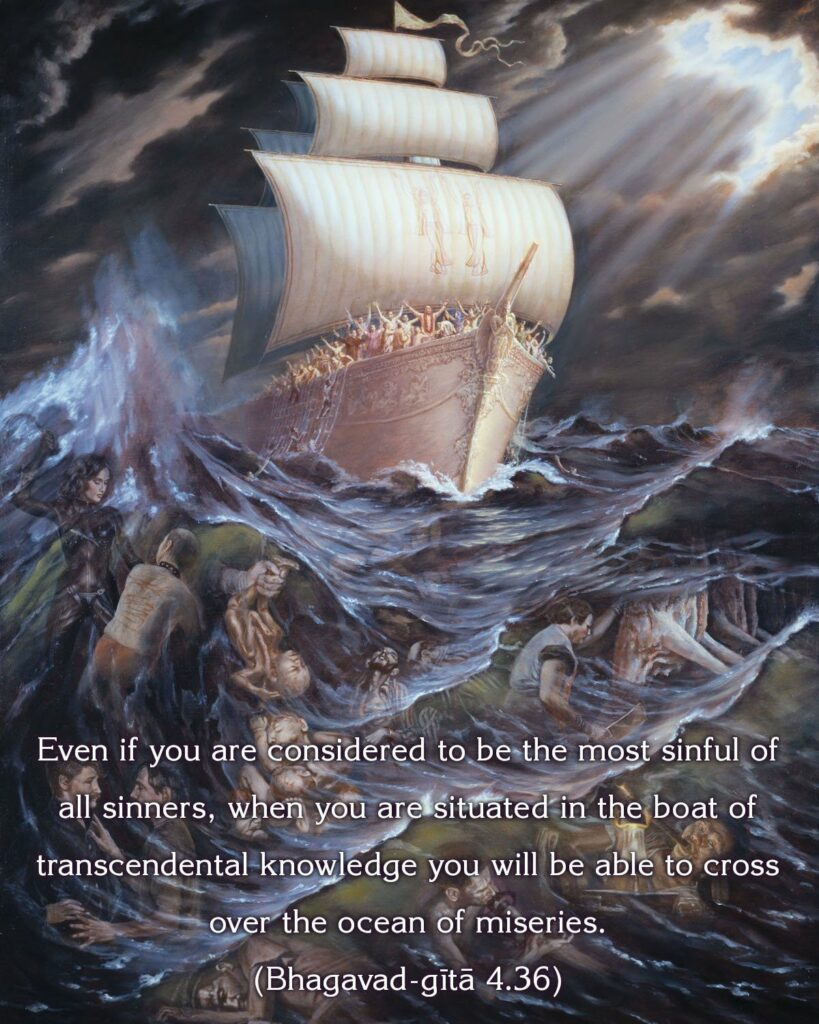अपि चेदसि पापेभ्य: सर्वेभ्य: पापकृत्तम: |
सर्वं ज्ञानप्लवेनैव वृजिनं सन्तरिष्यसि || 36||
api ched asi pāpebhyaḥ sarvebhyaḥ pāpa-kṛit-tamaḥ
sarvaṁ jñāna-plavenaiva vṛijinaṁ santariṣhyasi
api—even; chet—if; asi—you are; pāpebhyaḥ—sinners; sarvebhyaḥ—of all; pāpa-kṛit-tamaḥ—most sinful; sarvam—all; jñāna-plavena—by the boat of divine knowledge; eva—certainly; vṛijinam—sin; santariṣhyasi—you shall cross over
Translation:
Even if you are the most sinful of all sinners you shall cross all sin by the raft of Knowledge.
Commentary:
The excellence of Brahmajnana is further declared here. Even the worst sinner can purify himself of all sins by Knowledge. Mountains of sins are burnt into ashes in a trice by a spark of divine wisdom. That is why the Lord gives a highly superlative definition of the sinner. If even the most wicked is able to cross over all sin by the raft of Knowledge, others need not have any doubt about their salvation through knowledge. Enough it is if there is repentance and a determination to sin no more.
The verse does not mean that people wilfully commit sins. That is not the import of the Lord’s teaching. In former births, out of ignorance, a man might have committed several kinds of sins, but all of them would be cleared when the light of knowledge dawns. Indeed man’s sins are compared to an ocean and Knowledge is rightly spoken of as the launch to cross the ocean. We have such examples of sinners turned into saints. The life of Valmiki illustrates this point. He lived the life of a dacoit in the beginning, but when wisdom dawned on him the sinner was transformed into a saint.
Sri Ramakrishna Says —
A DEVOTEE: “Sir, is there no help, then, for such a worldly person?”
MASTER: “Certainly there is. From time to time he should live in the company of holy men, and from time to time go into solitude to meditate on God. Furthermore, he should practise discrimination and pray to God, ‘Give me faith and devotion.’ Once a person has faith he has achieved everything. There is nothing greater than faith.
(To Kedar) “You must have heard about the tremendous power of faith. It is said in the Purana that Rama, who was God Himself — the embodiment of Absolute Brahman — had to build a bridge to cross the sea to Ceylon. But Hanuman, trusting in Rama’s name, cleared the sea in one jump and reached the other side. He had no need of a bridge. (All laugh.) “Once a man was about to cross the sea. Bibhishana wrote Rama’s name on a leaf, tied it in a corner of the man’s wearing-cloth, and said to him: ‘Don’t be afraid. Have faith and walk on the water. But look here — the moment you lose faith you will be drowned.’ The man was walking easily on the water. Suddenly he had an intense desire to see what was tied in his cloth. He opened it and found only a leaf with the name of Rama written on it. ‘What is this?’ he thought. ‘Just the name of Rama!’ As soon as doubt entered his mind he sank under the water.
“If a man has faith in God, then even if he has committed the most heinous sins — such as killing a cow, a brahmin, or a woman — he will certainly be saved through his faith. Let him only say to God, ‘O Lord,! will not repeat such an action’, and he need not be afraid of anything.” (BG 10.3, BG 4.36, BG 9.32, BG 18.66)
When he had said this, the Master sang:
If only I can pass away repeating Durga’s name,
How canst Thou then, O Blessed One,
Withhold from me deliverance,
Wretched though I may be?
I may have stolen a drink of wine, or killed a child unborn,
Or slain a woman or a cow,
Or even caused a brahmin’s death;
But, though it all be true,
Nothing of this can make me feel the least uneasiness;
For through the power of Thy sweet name
My wretched soul may still aspire
Even to Brahmanhood. (Source: Gospel of Sri Ramakrishna)
Related Articles:
- Who knows Me as the birthless, without a beginning, the Lord of all the worlds, he among mortals is undeluded and freed from all sins. (BG 10.3)
- Having abandoned all duties (Dharmas) take refuge in Me alone. I will liberate you from all sins. Do not grieve. (BG 18.66)
Question: What are the means to overcome sins?
Answer: Knowledge.
Question: What is the excellence of Jnana?
Answer: Jnana purifies the worst sinner and leads him to liberation.
Bhagavad Gita: Chapter 4 🔻 (42 Verses)
